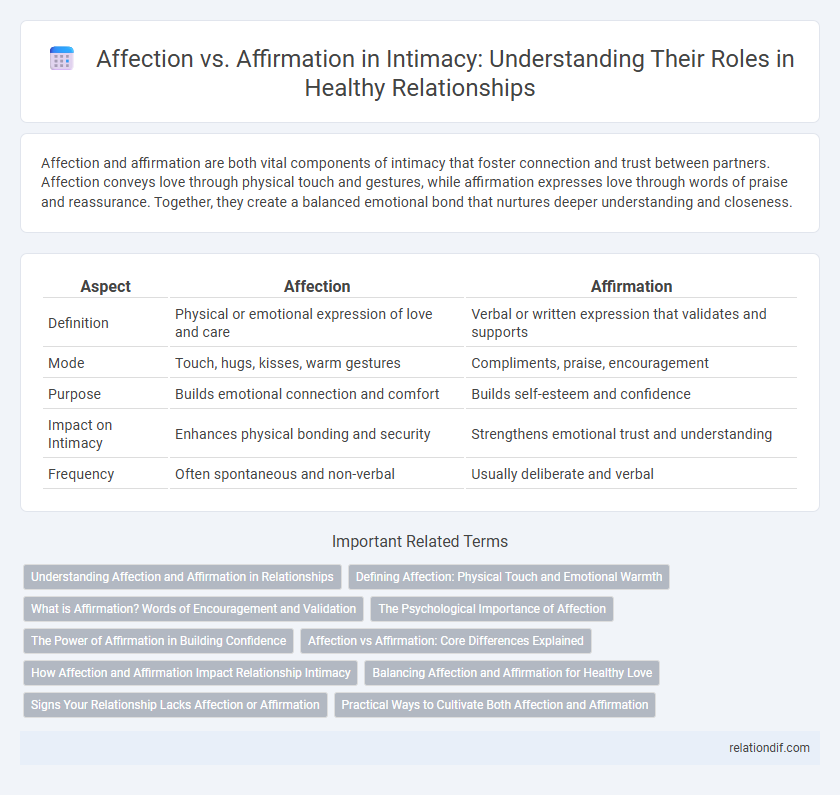Affection and affirmation are both vital components of intimacy that foster connection and trust between partners. Affection conveys love through physical touch and gestures, while affirmation expresses love through words of praise and reassurance. Together, they create a balanced emotional bond that nurtures deeper understanding and closeness.
Table of Comparison
| Aspect | Affection | Affirmation |
|---|---|---|
| Definition | Physical or emotional expression of love and care | Verbal or written expression that validates and supports |
| Mode | Touch, hugs, kisses, warm gestures | Compliments, praise, encouragement |
| Purpose | Builds emotional connection and comfort | Builds self-esteem and confidence |
| Impact on Intimacy | Enhances physical bonding and security | Strengthens emotional trust and understanding |
| Frequency | Often spontaneous and non-verbal | Usually deliberate and verbal |
Understanding Affection and Affirmation in Relationships
Affection in relationships often manifests through physical touch, warm gestures, and emotional closeness, creating a sense of security and bonding between partners. Affirmation involves verbal expressions of appreciation, encouragement, and validation, which foster trust and reinforce positive self-esteem. Understanding the balance between affection and affirmation helps partners communicate love in ways that resonate deeply, enhancing intimacy and emotional connection.
Defining Affection: Physical Touch and Emotional Warmth
Affection encompasses physical touch and emotional warmth, serving as a foundational element of intimacy that fosters connection and security between partners. Physical touch, such as hugging, holding hands, and gentle caresses, conveys love and reassurance beyond words. Emotional warmth involves expressing kindness, empathy, and genuine concern, creating a safe space for vulnerability and deepening relational bonds.
What is Affirmation? Words of Encouragement and Validation
Affirmation in intimacy refers to expressing words of encouragement and validation that reinforce a partner's worth and feelings, fostering emotional security and connection. These affirming statements, such as compliments or acknowledgments of effort, strengthen trust and support a positive self-image within the relationship. Consistent verbal affirmation helps build a foundation of mutual respect and deepens emotional intimacy.
The Psychological Importance of Affection
Affection plays a crucial role in psychological well-being by fostering emotional security and strengthening interpersonal bonds. Physical touch and expressions of warmth release oxytocin, a hormone linked to reducing stress and promoting feelings of safety. Unlike verbal affirmation, which validates thoughts and achievements, affection directly nurtures emotional health and builds trust in intimate relationships.
The Power of Affirmation in Building Confidence
Affirmation plays a crucial role in building confidence by reinforcing positive self-perception and validating personal worth, which deepens intimacy. Unlike affection, which conveys love through physical touch or gestures, affirmation uses words of encouragement and recognition to nurture emotional security. Consistent verbal affirmations strengthen trust and empower individuals to express their true selves within relationships.
Affection vs Affirmation: Core Differences Explained
Affection involves physical expressions of love such as hugs, kisses, and touch that foster emotional closeness and bonding. Affirmation focuses on verbal communication, offering supportive words, praise, and positive reinforcement to build confidence and trust. Understanding the core differences between affection and affirmation helps partners meet each other's emotional needs effectively, enhancing intimacy in relationships.
How Affection and Affirmation Impact Relationship Intimacy
Affection, expressed through physical touch and gestures, fosters emotional closeness by creating a sense of safety and warmth in relationships. Affirmation, involving verbal expressions of appreciation and encouragement, strengthens trust and validates partners' feelings, deepening emotional bonds. The interplay of consistent affection and affirmation significantly enhances relationship intimacy by promoting open communication and mutual understanding.
Balancing Affection and Affirmation for Healthy Love
Balancing affection and affirmation cultivates a deeper emotional connection and strengthens intimacy in relationships. Affection expresses love through physical touch and warmth, while affirmation provides reassurance through words and validation, creating a comprehensive sense of security. Prioritizing both elements promotes mutual understanding and nurtures sustainable, healthy love.
Signs Your Relationship Lacks Affection or Affirmation
A relationship lacking affection or affirmation often exhibits signs such as decreased physical touch, limited verbal expressions of love, and emotional distance between partners. You may notice a lack of comforting gestures, infrequent compliments, or minimal acknowledgment of each other's efforts, which diminishes emotional connection. These indicators can lead to feelings of loneliness and unmet emotional needs, signaling that intimacy requires nurturing through both affection and affirmation.
Practical Ways to Cultivate Both Affection and Affirmation
Expressing physical touch, such as hugs and gentle touches, fosters affection by creating a sense of closeness and comfort. Verbal affirmations like sincere compliments and appreciative statements reinforce positive self-worth and strengthen emotional bonds. Integrating daily rituals that combine both, such as sharing gratitude while holding hands, enhances intimacy through consistent and meaningful connection.
affection vs affirmation Infographic

 relationdif.com
relationdif.com